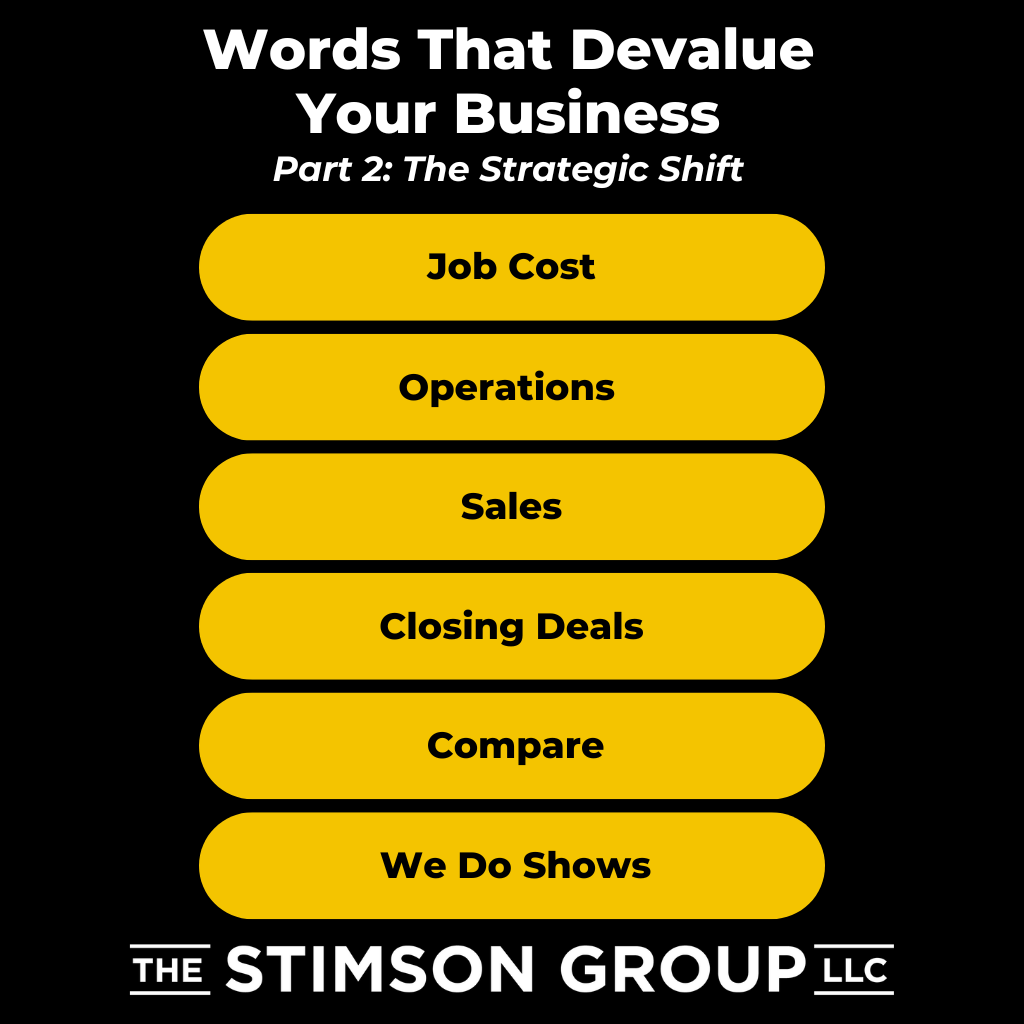
Listen instead on your Monday Morning Drive:
Let’s tackle another set of terms that might be even more insidious because they’re ingrained in how we think about running our businesses.
These words and phrases don’t just affect how we talk to customers. They shape how we organize our companies and measure our success.

Part 2: The Strategic Shift
Job Cost
We don’t need to stop using “job cost” altogether. We just need to stop using it incorrectly.
Job cost is an out-of-date accounting concept that tried to adapt rental pricing and transactional rental deals to service deals — which is what it actually takes to get a show done. When accountants tried to reconcile whether a job was profitable, they created these job costing systems, which often led us to the wrong conclusions.
The term “job cost” was a Band-Aid that helped us understand rental transactions’ profitability. The problem is that job costing assumes profit and value are predetermined. If you’re comparing the job cost of one job to another, you’re missing the point.
Every job could have made more money. It also could have made less. Was the margin appropriate to the project’s unique circumstances?
Instead of focusing on job cost, think about profit analysis. Your value isn’t in how you allocate costs. It’s in how you generate profit from each project’s unique circumstances.
Operations
Think of Operations like a door you open and close as you’re giving a tour of your building: “And here’s Operations. Next, let’s look at the IT closet…” That’s how meaningless this term has become.
“Operations” doesn’t describe anything of value. I hear it constantly: “I’m not sales — I’m ops,” or, “I work for a living; I’m in operations.”
Traditionally, we’ve replaced “operations” with “project management,” but that has the same problem. (Project management is also a generic, devaluing term that says we can’t do a project ourselves, so we have to designate somebody to make it happen inside our own company.)
What we’ve traditionally called “Operations” is a complex service organization that needs to be valued, treated, and represented. This is why I’ve adopted the term “planning” — because your operational team does the planning required to get a show done. Planning permeates a job’s entire life, not just its execution phase.
Sales
Ninety percent of the people I talk to whose role in an organization is sales reject the title of salesperson. “I’m not in sales; I’m a production manager.” “I’m not in sales; I’m an account manager.”
And good for them, because “sales” is transactional. Nobody wants to talk to “sales.” Salespeople conduct transactions, and no one wants to do that.
Since sales is a process and the term “salesperson” doesn’t represent this process, we need to think differently about the interface between our selling organization and customers. In my experience, three primary roles in the customer-facing selling organization manage deals:
- Account Executives work with clients who do business with you all the time.
- Account Managers work with customers who bring one project at a time.
- Customer Service Representatives assist Account Executives and Account Managers or conduct small transactions that don’t require the entire selling process.
You can use other titles (Customer Success Representative, Event Architect, etc.). Just don’t use “sales.”
Closing Deals
“We closed the deal!” No, you didn’t.
In our business of shows, plans change constantly. There’s no such thing as a “final deal.” The deal is done when the show is over and you send the final invoice. That’s when it’s really “closed.”
Our process is ever-iterative. When a salesperson says they’ve closed a deal, they’re saying they’ve agreed to something that’ll change.
You’re looking for customers to confirm you’ll work together, but that’s not a done deal. That’s a continuation of the process.
Stop trying to win the job and focus on winning the customer. Closing a deal implies there’s a predetermined beginning, middle, and end, but that’s not what happens. At some point, you agree to continue working together, and how you work together will change.
“Closing a deal” suggests it’s done and you can move on to the next one. That’s how customers get neglected. That’s how we fall behind. Move the process along instead of trying to close it.
Compare
When we invite customers to do a comparison — when we try to provide “apples to apples” quotes — we invite them to strip away our value proposition. Asking customers to compare us to others tells them we’re price-vulnerable and don’t have a true value proposition.
This is difficult to move away from because to stop comparing ourselves to others, our value proposition must be more self-evident.
And here’s the kicker: Value-add doesn’t help your comparison because value-add is simply giving something away for free, which strips away your value proposition. If it was truly valuable, you’d charge for it.
We Do Shows
You don’t do shows. Your customers do shows, which is why they need you. You get shows done.
The customer wants to do a show. They need help getting it done. They need to contract a venue, buy food and beverage, rent tables and chairs, hire presenters, and get audiovisual support. You’re part of getting their show done.
When you say you do shows, you put yourself ahead of the customer. You say it’s your show, not theirs, which undermines your relationship. You also put the wrong emphasis on what you do, which affects your internal processes.
Getting shows done is a process. Sell the process. Seek buyers who understand that a transaction is not in their best interest. Hiring somebody to do their show for them is a transaction; hiring somebody to get their show done has more value.
Final Thoughts
Words matter. They shape our thoughts, influence our actions, and color our clients’ perceptions.
The language we’ve used in the live events industry for decades is holding us back, anchoring us to outdated, transactional business models that don’t reflect the true value we provide. Overhauling our lexicon changes how we think about our businesses and how we present ourselves to the world.
Let’s break it down:
- From Transactions to Partnerships: When we stop talking about “rentals,” “labor,” and “discounts,” we position ourselves as strategic partners rather than mere vendors. We’re not just providing equipment and bodies. We’re offering expertise, creativity, and peace of mind.
- From Commodities to Value: Eliminating words like “markup” and focusing on “margin” helps us — and our clients — understand the real value we’re providing. It’s not about how much we charge above cost; it’s about our services’ worth.
- From Generic to Specific: Replacing vague terms like “operations” with more precise language like “planning” demonstrates the thought and strategy that go into every project.
- From Short-Term to Long-Term: When we stop “closing deals” and start “confirming partnerships,” we signal our commitment to long-term relationships. We’re here to support our clients’ ongoing success, not to help out with a single show.
- From Reactive to Proactive: Eliminating “downtime” from our vocabulary pushes us to think more strategically about our business. There’s always work to be done, whether it’s serving clients or improving our processes.
- From Comparison to Differentiation: When we stop inviting clients to “compare” us to competitors, we focus on what truly sets us apart. Our goal should be to make our value so clear that comparison becomes irrelevant.
This shift in language isn’t just cosmetic. It aligns our words with the reality of what we do and the value we provide. It’s about respect — for ourselves, our team members, and our clients. And ultimately, it’s about building more successful, profitable businesses.
So, pay attention to your words when discussing your business. Catch yourself when you fall back on old habits. It won’t be easy — these terms are deeply ingrained in our industry. But with conscious effort, we can create a new lexicon that reflects the sophisticated, value-driven businesses we’ve become.






Leave a Reply